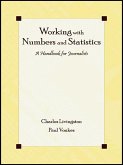Jessica Roberts explains how the cognitive and emotional factors affecting human behaviour converge with the structural factors in current communication technologies to create an unhealthy information ecosystem, one in which journalists are at a disadvantage.
The central argument of the book is that journalists and audiences can no longer afford to pretend that all information is competing on an even playing field, and that it is enough for journalists to simply publish "the facts." Effective Journalism explains the reality, rather than the ideal, of how people seek and process information, and what journalists and their audiences can do to try to create an informed public in the face of that reality.
Hinweis: Dieser Artikel kann nur an eine deutsche Lieferadresse ausgeliefert werden.
The central argument of the book is that journalists and audiences can no longer afford to pretend that all information is competing on an even playing field, and that it is enough for journalists to simply publish "the facts." Effective Journalism explains the reality, rather than the ideal, of how people seek and process information, and what journalists and their audiences can do to try to create an informed public in the face of that reality.
Dieser Download kann aus rechtlichen Gründen nur mit Rechnungsadresse in A, D ausgeliefert werden.
Hinweis: Dieser Artikel kann nur an eine deutsche Lieferadresse ausgeliefert werden.









